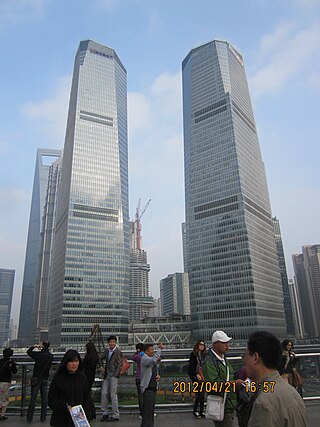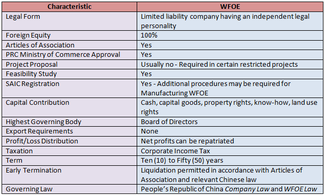Business is the practice of making one's living or making money by producing or buying and selling products. It is also "any activity or enterprise entered into for profit."

A joint-stock company is a business entity in which shares of the company's stock can be bought and sold by shareholders. Each shareholder owns company stock in proportion,evidenced by their shares. Shareholders are able to transfer their shares to others without any effects to the continued existence of the company.

Incorporation is the formation of a new corporation. The corporation may be a business,a nonprofit organization,sports club,or a local government of a new city or town.
A joint venture (JV) is a business entity created by two or more parties,generally characterized by shared ownership,shared returns and risks,and shared governance. Companies typically pursue joint ventures for one of four reasons:to access a new market,particularly Emerging market;to gain scale efficiencies by combining assets and operations;to share risk for major investments or projects;or to access skills and capabilities.

A foreign direct investment (FDI) refers to purchase of an asset in another country,such that it gives direct control to the purchaser over the asset. In other words,it is an investment in the form of a controlling ownership in a business,in real estate or in productive assets such as factories in one country by an entity based in another country. It is thus distinguished from a foreign portfolio investment or foreign indirect investment by a notion of direct control.

Corporate law is the body of law governing the rights,relations,and conduct of persons,companies,organizations and businesses. The term refers to the legal practice of law relating to corporations,or to the theory of corporations. Corporate law often describes the law relating to matters which derive directly from the life-cycle of a corporation. It thus encompasses the formation,funding,governance,and death of a corporation.

The People's Insurance Company (Group) of China Limited,known as PICC Group or just PICC,is a Chinese listed insurer. The Chinese Central Government is the controlling shareholder.

A limited partnership (LP) is a form of partnership similar to a general partnership except that while a general partnership must have at least two general partners (GPs),a limited partnership must have at least one GP and at least one limited partner. Limited partnerships are distinct from limited liability partnerships,in which all partners have limited liability.
In justifying opening up and the series of economic reforms that ensued,Deng referred to Marx and his theories,which predicted that nations need to undergo urbanization and a stage of capitalism for a natural socialist transition. One of the most renowned reforms under Deng was establishing four "special economic zones" along the Southeastern coast of China,with Shenzhen,Shantou,and Zhuhai located in Guangdong province and Xiamen located in Fujian province. Special economic zones (SEZs) in mainland China are granted more free market-oriented economic policies and flexible governmental measures by the government of China,compared to the planned economy elsewhere.
Go Out policy is the People's Republic of China's current strategy to encourage its enterprises to invest overseas. The policy was announced by Jiang Zemin in March 2000.

A company,abbreviated as co.,is a legal entity representing an association of people,whether natural,legal or a mixture of both,with a specific objective. Company members share a common purpose and unite to achieve specific,declared goals. Companies take various forms,such as:

Foreign direct investment in Iran (FDI) has been hindered by unfavorable or complex operating requirements and by international sanctions,although in the early 2000s the Iranian government liberalized investment regulations. Iran ranks 62nd in the World Economic Forum's 2011 analysis of the global competitiveness of 142 countries. In 2010,Iran ranked sixth globally in attracting foreign investments.

HSBC Bank (China) Company Limited was one of the first foreign banks to incorporate locally in mainland China in 2007. It is part of the worldwide HSBC Group and is wholly owned by Hong Kong-based HSBC.
Between 1950 and 1960,the imperial government of Ethiopia enacted legislation and implemented a new policy to encourage foreign investment in the Ethiopian economy. This new policy provided investor benefits in the form of tax exemptions,remittances of foreign exchange,import and export duty relief,tax exemptions on dividends,and the provision of financing through the Ethiopian Investment Corporation and the Development Bank of Ethiopia. In addition,the government guaranteed protection to industrial enterprises by instituting high tariffs and by banning the importation of commodities that might adversely affect production of domestic goods. Protected items included sugar,textiles,furniture,and metal. The government also participated through direct investment in enterprises that had high capital costs,such as oil refineries and the paper and pulp,glass and bottle,tire,and cement industries. In 1963,with the Second Five-Year Plan under way,the government enacted Proclamation No. 51. The proclamation's objective was to consolidate other investment policies enacted up to that period,to extend benefits to Ethiopian investors,and to create an Investment Committee that would oversee investment programs. In 1966 the Ethiopian government enacted Proclamation No. 242,which elevated the Investment Committee's status as an advisory council to that of an authorized body empowered to make independent investment decisions. Thus,by the early 1970s,Ethiopia's industrialization policy included a range of fiscal incentives,direct government investment,and equity participation in private enterprises.

A low-profit limited liability company (L3C) is a legal form of business entity in the United States. Commonly referred to as a hybrid structure,it has characteristics of both for-profit and non-profit entities. L3Cs were created to comply with the Internal Revenue Service (IRS) program-related investments (PRIs) rules which allow most typically private foundations the ability to maintain tax-exempt status through investments in qualifying businesses and/or charities. With a social mission as the primary objective and a secondary objective of profit generation,the L3C legal form is considered a viable option for businesses seeking a reputation or marketability for being a social enterprise.
An international joint venture (IJV) occurs when two businesses based in two or more countries form a partnership. A company that wants to explore international trade without taking on the full responsibilities of cross-border business transactions has the option of forming a joint venture with a foreign partner. International investors entering into a joint venture minimize the risk that comes with an outright acquisition of a business. In international business development,performing due diligence on the foreign country and the partner limits the risks involved in such a business transaction.

Corporate law in Vietnam was originally based on the French commercial law system. However,since Vietnam's independence in 1945,it has largely been influenced by the ruling Communist Party. Currently,the main sources of corporate law are the Law on Enterprises,the Law on Securities and the Law on Investment.

United Arab Emirates corporate law regulates the governance,finance and power of corporations in the United Arab Emirates (UAE) through UAE law. Every emirate has its own basic corporate code.

The Foreign Investment Law is a law of the People's Republic of China governing foreign direct investment in China. The law was adopted by the National People's Congress on March 15,2019,and came into effect on January 1,2020. It replaces the Law of the People's Republic of China on Sino-Foreign Equity Joint Ventures,the Law of the People's Republic of China on Wholly Foreign-owned Enterprises,and the Law of the People's Republic of China on Sino-Foreign Cooperative Joint Ventures.









